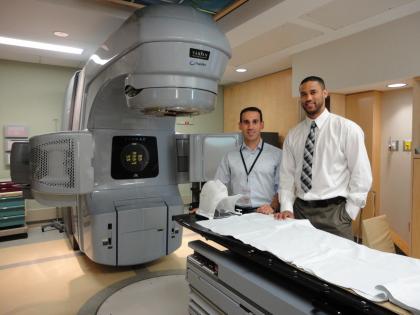ORATOR study launched
Thursday, July 12, 2012
Dr. David Palma, Assistant Professor in the Department of Oncology and Dr. Anthony Nichols, Assistant Professor in the Department of Otolaryngology -Head & Neck Surgery have launched the first trial in the world to compare robotic surgery to radiation for the treatment of oropharyngeal cancer (cancer of the back of the throat). The ORATOR trial, announced by the Lawson health Research Institute, will examine the impact of both treatments on patients' speech and swallowing function, and quality of life as a first step toward identifying the best treatment for patients.
Currently in Canada, radiation therapy, often combined with chemotherapy, is the accepted standard of care for patients with throat cancer. While radiation therapy provides good disease control and advances such as Intensity Modulated Radiotherapy help reduce side effects, some patients still experience long-term side effects that can be difficult to manage. Patients often complain of dry mouth, difficulty swallowing, hearing loss, skin discolouration, and taste changes.
Transoral robotic surgery (TORS) is a new method for treating throat cancer and overcomes some of the side effects and complications associated with previous surgical techniques for this cancer. Many centres in the United States are promoting its use; however, to date, no head-to-head comparison of TORS and radiation therapy has been conducted to determine which treatment truly provides the best outcomes for patients.

According to Dr. Anthony Nichols, a head and neck cancer surgeon at London Health Sciences Centre, TORS can be an ideal treatment for select patients, while sparing them from radiation-related side effects. "Early studies of TORS show it holds promise to provide good disease control, as well as offer good speech and swallowing outcomes for patients. However, it is important that we conduct a thorough comparison of the two treatments," says Dr. Nichols. As the only centre in Canada with a TORS program (located at the Canadian Surgical Technologies and Advanced Robotics (CSTAR)) the researchers are in a unique position to carry out a carefully controlled comparison of the two treatments.
Cases of throat cancer have more than doubled since the mid-1990s. Historically, throat cancer was mostly seen in elderly patients with a history of heavy smoking and drinking. However, physicians have seen a dramatic rise in throat cancer caused by human papilloma virus (HPV). "Today, most of the cases we see are HPV-related," says Dr. David Palma, a radiation oncologist at LHSC. With this development has also come a change in patient demographic. "Patients who have HPV-related throat cancer are younger and usually healthier," says Dr. Palma. "In addition, cure rates of HPV-related cancers are better. These cancers respond well to treatment, making quality of life after treatment very important."
Department of Oncology Chair/Chief Dr. Glenn Bauman states, "ORATOR asks an important question regarding the relative benefits of two advanced therapeutic technologies for head and neck cancer. Through its interdisciplinary research teams and advanced treatment facilities London is uniquely positioned to conduct trials like ORATOR that will help define new standards of care for cancer patients."








